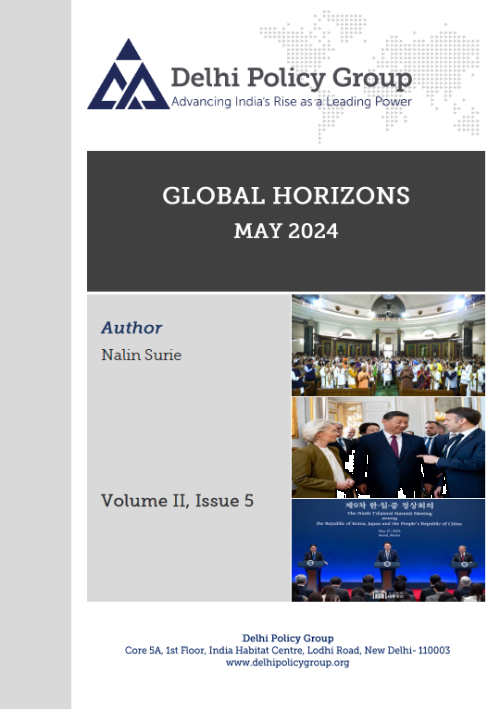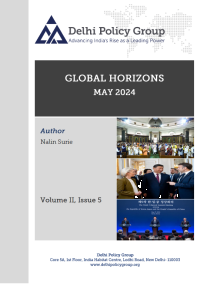Global Horizons
Date: June 08, 2024
There was little relief during the month from the continuing carnage in Gaza, the grind of death and destruction in the Ukraine war, the tragic civil war in Sudan, the horrendous but virtually forgotten civil war in Myanmar, and tensions across the Taiwan Strait.
The author opens with the observation that US pressure on Israel has been unable to fully restrain the latter from military operations in Gaza; avoiding collateral damage appears to have become irrelevant. Decisions of the ICJ and recommendations of the ICC have met with harsh rejection from Israel. Western unity on unrestrained Israeli actions have, as a result, continued to fray.
Meanwhile, the situation in Ukraine remains grim, notwithstanding the resumption of US weapon deliveries. President Zelensky has openly called out China for supporting Russia’s war effort, signalling frustration at decisions on Ukraine at the Russia-China summit held in Beijing on May 15, which referred to the need to eliminate “root causes of the crisis”. China has refused to participate in the Ukraine peace conference planned for June since Russia has not been invited.
At meetings held during the month, NATO Foreign Ministers and G7 Finance Ministers reiterated strong commitments to Ukraine.
President Xi Jinping paid an important probing visit to France, Serbia and Hungary from May 5-9 amidst a souring EU-China relationship. Commentaries on the visit to France were highly critical of Xi’s attempt to advance the objectives of Chinese power without offering any concessions to the EU.
President Putin’s visit to China on May 15 marked a significant new stage in the growing Sino-Russian concord. A lengthy joint statement issued following the Putin-Xi summit laid out the contours for the further comprehensive development of Russia-China relations based on mutuality of benefit and the need to ensure equal and indivisible security. China and Russia also signalled their desire to become dominant players in Eurasia.
China responded to the inauguration of the new President of Taiwan, Lai Ching-te, on May 20 with a massive show of military force surrounding the island.
With the convening of the 9th Trilateral China-Japan-ROK summit in Seoul on May 27, China pursued efforts to mend fences with two important neighbours and trade technology partners, urging them to deepen unimpeded trade and advance people-to-people ties. An anodyne joint declaration was issued, focusing on the regularity of summits and other high-level meetings.
The author also traces progress of the EU’s efforts to develop a common security and defence policy, including by enhancing strategic partnership with NATO to bolster Euro-Atlantic security.
With the defeat of the ANC in elections held in South Africa on May 29, the author observes that an era has ended and the onus is on South Africa’s political parties to demonstrate that a plural democracy has taken firm root in the country.
Finally, the author observes that the peaceful and successful conduct of the general elections in India, which concluded on June 1, has once again demonstrated that in India it is the people who are the ultimate masters and arbiters. Indian democracy and its institutions stand tall as ever.
To read this Global Horizons, Vol. II, Issue 5, please see the PDF attached.
The author opens with the observation that US pressure on Israel has been unable to fully restrain the latter from military operations in Gaza; avoiding collateral damage appears to have become irrelevant. Decisions of the ICJ and recommendations of the ICC have met with harsh rejection from Israel. Western unity on unrestrained Israeli actions have, as a result, continued to fray.
Meanwhile, the situation in Ukraine remains grim, notwithstanding the resumption of US weapon deliveries. President Zelensky has openly called out China for supporting Russia’s war effort, signalling frustration at decisions on Ukraine at the Russia-China summit held in Beijing on May 15, which referred to the need to eliminate “root causes of the crisis”. China has refused to participate in the Ukraine peace conference planned for June since Russia has not been invited.
At meetings held during the month, NATO Foreign Ministers and G7 Finance Ministers reiterated strong commitments to Ukraine.
President Xi Jinping paid an important probing visit to France, Serbia and Hungary from May 5-9 amidst a souring EU-China relationship. Commentaries on the visit to France were highly critical of Xi’s attempt to advance the objectives of Chinese power without offering any concessions to the EU.
President Putin’s visit to China on May 15 marked a significant new stage in the growing Sino-Russian concord. A lengthy joint statement issued following the Putin-Xi summit laid out the contours for the further comprehensive development of Russia-China relations based on mutuality of benefit and the need to ensure equal and indivisible security. China and Russia also signalled their desire to become dominant players in Eurasia.
China responded to the inauguration of the new President of Taiwan, Lai Ching-te, on May 20 with a massive show of military force surrounding the island.
With the convening of the 9th Trilateral China-Japan-ROK summit in Seoul on May 27, China pursued efforts to mend fences with two important neighbours and trade technology partners, urging them to deepen unimpeded trade and advance people-to-people ties. An anodyne joint declaration was issued, focusing on the regularity of summits and other high-level meetings.
The author also traces progress of the EU’s efforts to develop a common security and defence policy, including by enhancing strategic partnership with NATO to bolster Euro-Atlantic security.
With the defeat of the ANC in elections held in South Africa on May 29, the author observes that an era has ended and the onus is on South Africa’s political parties to demonstrate that a plural democracy has taken firm root in the country.
Finally, the author observes that the peaceful and successful conduct of the general elections in India, which concluded on June 1, has once again demonstrated that in India it is the people who are the ultimate masters and arbiters. Indian democracy and its institutions stand tall as ever.
To read this Global Horizons, Vol. II, Issue 5, please see the PDF attached.



